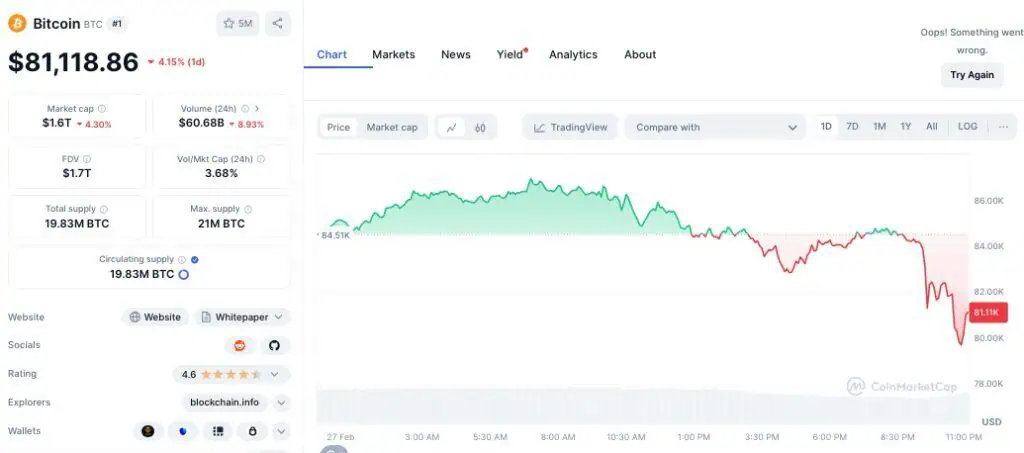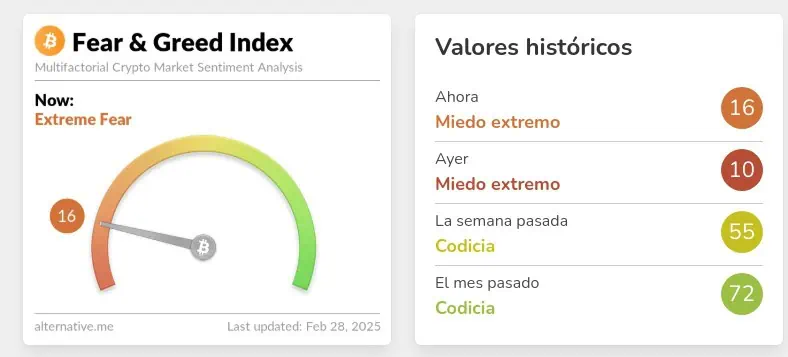
Bitcoin price fell by 5% on February 27, reaching a value of $79.600, its lowest level in the last three months. Although it partially recovered, factors such as massive withdrawals from spot ETFs and geopolitical tensions maintain the bearish sentiment.
On Wednesday, February 27, Bitcoin recorded a further 5% drop, taking its price to a low of $79.600, a level not seen since November 2024. Although the leading cryptocurrency has partially recovered, and is trading above $81.000 at the time of writing, the market remains cautious.
The sudden volatility wiped out nearly $200.000 billion from BTC’s market cap and nearly $500.000 billion from the total crypto sector’s capitalization, according to data from CoinMarketCap.
BUY BITCOINAs we have reported in this medium, several analysts point out that the collapse responds to a combination of factors, including record withdrawals in exchange-traded funds, the impact of economic policies and tariffs in the United States, and distrust in centralized solutions after the largest historical hack of an exchange. Alex Thorn, head of research at Galaxy Research, anticipates that the downward pressure on the price of BTC could continue, with a possible drop to $75.000 before stabilizing.
Trump's tariffs and macroeconomic tension
Donald Trump's administration, which took office in January promising to support cryptocurrencies, has implemented a series of tariffs on trading partners such as China, Mexico and Canada. These moves have triggered concerns about possible inflation and a weakening global economy, which has affected investors' perception of risk assets.

Source: CoinMarketCap
Moreover, analysts such as Petr Kozyakov have highlighted the absence of concrete measures by Trump towards the crypto sector. While it is true that the American president signed an executive order related to cryptocurrencies, there are still many doubts and uncertainties about whether he will fulfill his campaign promises, such as the creation of a "Strategic Bitcoin Reserve."
Currently, the Cryptocurrency Fear and Greed Index, a barometer of market sentiment, has fallen to its lowest level in the past two years, with a score of 10 reflecting “extreme fear” among investors.

Source: Alternatives
Record withdrawals on spot ETFs
On the other hand, according to data consulted on the Soso Value platform, Bitcoin exchange-traded funds (ETFs) continue to register massive outflows.
Over the past week, more than $2.600 billion has left these funds, with February 25 being the day that saw the second-highest outflow this year, totaling $1.000 billion. This institutional exodus reduced market liquidity, exacerbating the decline.

Source: Soso Value
The Bybit Hack
In addition to Trump’s tariff policies and macroeconomic tensions, on Friday, February 21, hackers associated with the North Korean group Lazarus stole $1.400 billion worth of Ethereum from a cold wallet of Bybit, one of the largest cryptocurrency platforms in the world. Although the platform secured user funds, the incident revived security concerns, generating a new wave of crypto asset sales.

Cryptocurrency Technical Analysis Course
Medium levelIn this training we have Iván González, a professional expert in investments and cryptocurrencies, to teach you how the market works and how prices affect the behavior of investors.
Analysts have pointed out that these episodes erode retail confidence, especially among new investors. Fear of similar hacks could explain part of the rush to sell, although analysts such as David Battaglia dismiss this as the main factor, pointing that geopolitical pressures and inflationary fears are the real catalysts.
In short, Bitcoin’s crash to $79.600 reflects a market sensitive to external factors, although the subsequent rally suggests resilience. Nevertheless, bearish sentiment persists and experts still warn that BTC price could continue to fall and test new levels in the near term.
BUY BITCOINInvesting in cryptoassets is not fully regulated, may not be suitable for retail investors due to high volatility and there is a risk of losing all invested amounts.



